KYIV—A Russian soldier was pointing a gun at her head from behind the television camera. The film crew had come from one of Moscow’s state-owned TV stations and Olena Yahupova had no choice but to tell them exactly what they wanted to hear.
Otherwise—they told her—she would be shot.
The footage of Yahupova saying that she was an extremist who had helped the Ukrainian military try to fight the occupation of her town, Kamianka Dniprovska, was broadcast across Russia by RIA Novosti as supposed proof of the nefarious means of the Ukrainian people.
Pictured wearing a beige coat on top of a yellow jacket, Yahupova sounded convincing as she explained, “We are located in the town of Kamianka Dniprovska, near the cannery factory district, and behind me is a dormitory and a hotel.” Yahupova says she was ordered to confess to collaborating with “Aladdin,” a data-driven Telegram channel supporting Ukraine’s resistance. “Aladdin gave me instructions on what I needed to do, what coordinates to transfer, and what buildings [to target]. Then, accordingly, there were hits to these facilities,” said Yahupova.
Her eyes strayed off to the right, where they were looking directly down the barrel of a gun.
At the end of the interview, Yahupova was forced back into a small prison cell crammed with half a dozen other women. Yahupova, who was convicted on false charges, was surrounded by prisoners accused of robbery and murder.
Over the next five months, Yahupova says she was held as a prisoner in occupied Ukraine, simply because her husband was a Ukrainian soldier. She says she was tortured, threatened with murder, paraded on Kremlin-run media channels multiple times, and trafficked to a labor camp where she was forced to dig trenches for Russian brigades and help in the war effort.
Now safe in Kyiv, Yahupova, 51, told The Daily Beast what it was like to be a prisoner of Russia and a pawn of Russian President Vladimir Putin’s propaganda.
A Deadly Silence
By the end of the first week of the war, Kamianka Dniprovska, in the Zaporizhzhia region, had fallen under Russian occupation, a swift and total takeover that left few with time to escape. Unlike in other regions of Ukraine, where Russian soldiers had occupied villages with full force and brutality, their presence in Kamianka Dniprovska came quietly, with few altercations until military vans with the letter “Z” painted in white began to establish checkpoints and seize control of local government.
“They were not shooting people on the street, but they blocked the main roads,” recalled Yahupova from her apartment in Kyiv.
“They put up their checkpoints. They took over all the administrative buildings and enterprises, and many stores stopped working. Banks were closed. So you see, we changed to being under occupation,” she added.
For eight months, Yahupova lived alone in the town with her dog. Her husband, Arthur Yahupov, was fighting in Ukraine’s military on the front line in Kharkiv. Under Russian occupation, Yahupova said that some of the neighbors she had once been friendly with began to collaborate with the Russian military, telling them that Yahupova’s husband was a soldier.
“People who were previously in jail, they became the rulers. It happened that for the people who didn’t have a very good job, [collaborating] was a way to get into higher positions,” Yahupova explained, she said they took their knowledge of their neighbors and used it to ingratiate themselves with the occupying soldiers.
On Oct. 6, Yahupova says Russian soldiers appeared at her apartment and told her she would be taken to the police station for questioning. She says it turned into hours of interrogation and torture. Yahupova said she was beaten over the head with a bottle of water that cracked her head open, choked with a cable, and held at gunpoint. She says she was tortured for being married to a Ukrainian soldier and claimed Russian soldiers demanded information on her husband’s location and to name people in Kamianka Dniprovska who were pro-Ukrainian. Yahupova did not have any information, but was held for hours as blood dripped down the back of her neck throughout the interrogation. Then, she says she was thrown into a prison cell without receiving medical attention.
Over the next two weeks, Yahupova said she was taken out of the cell and interrogated multiple times. In at least four instances, she says she was tortured and hit repeatedly over the head while Russian soldiers threatened to kill her. Yahupova says Russian soldiers decided they either needed to charge her with a crime or let her go, so they settled on charging her with extremism and helping to direct Ukrainian artillery fire. She says she was forced to take part in the RIA Novosti interview. As we watched the video back in her apartment, Yahupova showed little emotion, much as she did on screen.

Yahupova during the RIA Novosti interview.
Anna ConklingOnce that video came to an end, Yahupova showed another one, where two trucks filled with Russian soldiers conducted a search on a house she owned. The video was set to suspenseful music and showed footage from soldiers’ body cameras as they held their guns while searching rooms in the house, the shed, and the cellar for evidence.
At one moment in the cellar, the video zooms in on a Ukrainian military badge and passport-style pictures of a Ukrainian soldier who was a friend of Yahupova, and two anti-tank rocket launchers.
Arthur Yahupov came in as the video ended and placed a tray with tea and three cups on a stool. Yahupova’s videos had circulated on Russian and Ukrainian social media channels, and eventually, one of the pair’s daughters saw the video and sent it to their father.
“I didn’t know where Olena was. Thanks to these video clips, I understood she had been taken by the Federal Security Service (FSB),” said Arthur.
Misinformation Warfare
Russia has used information manipulation and disinformation as an operational tool throughout its war in Ukraine, according to a report by the Organisation for Economic Cooperation and Development (OECD). They have spread misinformation by claiming that the war in Ukraine is a hoax; that Russia does not target civilian infrastructure; that the massacre in Bucha was staged, and that Nazis are rampant in Ukraine.
Russian war propaganda is disseminated across a large number of traditional media channels and online to indoctrinate Russian people with pro-war sentiment.
The Kremlin’s spending on mass media for the first quarter of 2022 was 322 percent higher than for the same period in 2021, reaching around $234 million, per the report. Almost 70 percent of Russia’s spending on mass media was spent in March, immediately after the invasion, and the outlets that received the funds included Russian Today and Rossiya Segodnya, which owns and operates Sputnik, and RIA Novosti, which broadcast Yahupova’s initial interview.
In Kyiv, Yahupova told me that her words were twisted and distorted by RIA Novosti to align with their narrative that she was part of a plot to attack the Russian military in Kamianka Dniprovska.
“They were asking me questions, and then they were putting my answers into a narrative, putting one on top of it on the other and then just falsifying it,” said Yahupova as she showed me the video.
“And it looks like I was giving the coordinates of the residential estate for our Ukrainian army and for the Ukrainian army to bomb the residential estate,” she added.
For the next three months, Yahupova was held in the prison cell in Kamianka Dniprovska, where she says she was fed oatmeal once or twice a day and slept on the cold concrete floor as there were only three beds in the room. Yahupova said the prisoners were forced to learn the Russian national anthem every day and beaten if they made any mistakes.
As the war raged on, Ukraine began to reclaim more land, and Yahupova says Russian soldiers at the prison became afraid that Ukrainian missiles would bomb the building or Kamianka Dniprovska would be liberated. On Jan. 18, Yahupova said that soldiers decided to move everyone at the prison to a labor camp elsewhere in the Zaporizhzhia region.
A Labor Camp of Horrors
A large number of Ukrainian civilians have been detained in Russian-controlled areas of the country over the last 22 months of the war. The confinement and forced deportation of civilians in conflict zones are labeled as war crimes under the Geneva Conventions. Forced deportation included the human trafficking of the prisoners in Kamianka Dniprovska to the labor camp in Zaporizhzhia.
In the dead of winter at the camp, Yahupova said she and her fellow inmates were forced to dig trenches “Every day from 6 a.m. until 8 p.m., and sometimes there were days from 6 a.m. to 4 a.m., we needed to dig trenches.”
Yahupova says the Russian soldiers told her, “Now you’re gonna be working for the prosperity of the Russian Federation. Go dig trenches.”
“It was January, and it was very muddy. There were also other people who were captured back in the summer. They didn’t even have any winter clothes,” said Yahupova.
The Russian troops Yahupova dug trenches for depended on the week. One time, it was the 23rd Brigade; another, it was the 60th Brigade.
The conditions at the camp were harsh. Yahupova says prisoners lived in an abandoned house overrun with rats and mice, and she slept with a man and a woman in the same bed. She says the Ukrainians were also forced to wash the clothes of Russian soldiers and to prepare food for the troops. Yahupova says some prisoners were beaten as they worked, and she claimed she met women who had been raped by Russian soldiers using sticks. While at the camp, Yahupova was forced to give additional interviews for the Kremlin media. She was paraded with two other male prisoners who were also accused of directing artillery fire and helping Ukraine’s military.
According to the U.N.’s Office of the High Commissioner for Human Rights (OCHR), torture and threats are common in Russian prisons. OCHR has located 161 detention centers throughout Russia, Ukraine, Crimea, and Belarus. The report says many of the 864 cases of arbitrary detention have amounted to enforced disappearance.
Back in Kyiv, Yahupova showed me an interview she was forced to do while she was a prisoner at the labor camp. She and the two other men were shown holding hands as they walked into the distance.

Another video of Yahupova and the two other men were forced to film, shown being “released” from a Russian labor camp.
Anna ConklingA narrating voice told the camera that the three were being released and walking towards a “gray area” neither occupied by Russians nor Ukrainians, given money and told to go home. Yahupova said the video was supposed to let the Russians “wash their hands” of the prisoners, but in reality, after the cameras had finished rolling, the three prisoners were brought back to the camp.
“This is [what the] Russians are doing. When the person disappears, they just show [this] for insurance. ‘We let them go, we didn’t take them,’” explained Yahupova.
The ‘Human Factor’
For months, it seemed that Yahupova would not be able to leave the camp. She says Russian soldiers told her would be a prisoner of the Kremlin for the rest of her life. But in March 2023, a Russian soldier stationed at the camp had a moment of sympathy for the inmates, what Yahupova referred to as the “human factor.”
The soldier allowed a prisoner to use his phone to call a relative, who eventually contacted higher-ups in Moscow and got the camp to let all of the civilians go. Yahupova was brought back to her occupied town, where she says she found that her dog had been killed by Russian soldiers. In one conversation, she says a solider told her what she had experienced was illegal but not to mention it to anyone. Eventually, Yahupova managed to escape the town, which was still under Russian occupation. After a long trip through Russia, the Northern Baltics, and Poland, she says she finally made it to Kyiv.

Yahupova shows a photograph from her wedding ceremony with her husband.
Anna Conkling
Yahupova and her husband.
Anna ConklingTwo months later, Yahupova was finally allowed to meet with her partner, who was still fighting on the frontlines. The pair met in Kharkiv, and held a church wedding after being married in a civil ceremony years before. At their apartment in Kyiv, Yahupova walked to a set of wooden drawers and showed me a large picture that had been taken at their wedding ceremony. In the picture, Yahupova’s husband Arthur wore his military uniform and smiled, and Yahupova wrapped her arm around his. She wore a traditional yellow and blue Ukrainian dress, held a large bouquet of blue, yellow, red, and white flowers, and smiled. Yahupova then showed me more pictures of her three daughters growing up. Yahupova only stayed in Kamianka Dniprovska for a few days before she escaped, but the pictures were some of the valuables she took with her.
In the darkest moments of her prison sentence, Yahupova told me she held onto the memories of her family to keep her sane. But she said that after five months of torture and abuse at the hands of Russian prisoners, she has still yet to recover. Although she has found the strength to speak about her experience openly, she said, “I’m not OK. I don’t think I will ever be back to normal.”








